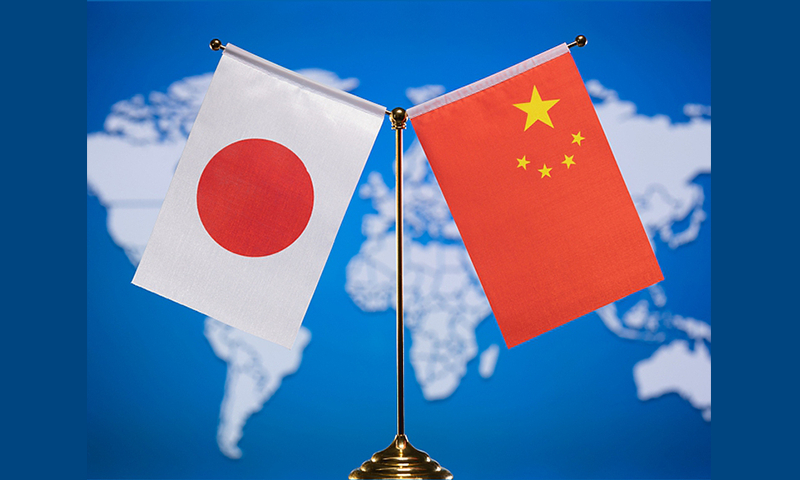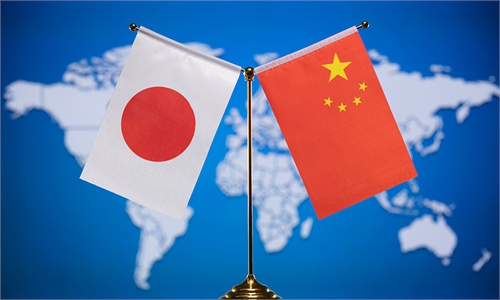China, Japan hold high-level maritime consultations; overall stability of ties foundation for concrete communication: observer

China Japan
China and Japan on Tuesday held the 14th round of high-level consultations on maritime affairs via video link, where the two sides recognized 10 years of the mechanism's role in enhancing mutual understanding, safeguarding marine security and promoting pragmatic cooperation.
According to the official release of the event by the Chinese Foreign Ministry, the two sides agreed to take the 50th anniversary of the normalization of China-Japan diplomatic relations this year and the 45th anniversary of the signing of China-Japan Treaty of Peace and Friendship next year as the opportunity to step up dialogue and communication on maritime issues, properly manage problems and disagreements, further advance maritime practical cooperation and personnel exchanges, and work actively to build the East China Sea into a sea of peace, cooperation and friendship.
China and Japan reached consensus on specific cooperation, including to speed up the construction of the direct telephone line connection under the maritime and air liaison mechanism of both countries' defense sectors, carrying out exchanges between maritime law enforcement officers, continuing carrying out joint exercises for maritime search and rescue, as well as jointly combatting cross-border maritime crimes and illegal fishing.
The virtual consultations were a concrete step toward implementing the bilateral consensus reached by Chinese President Xi Jinping and Japanese Prime Minister Fumio Kishida during their meeting on the sidelines of the Asia-Pacific Economic Cooperation (APEC) in Bangkok, Thailand, observers said.
In his meeting with Kishida, Xi said China is ready to work with Japan to grasp the general direction of bilateral relations from a strategic height and build a China-Japan relationship that meets the demands of the new era.
The two leaders agreed that China and Japan should intensify high-level exchanges and communication to constantly improve political mutual trust and jointly build a constructive, stable and important China-Japan relationship fit for the new era, the Xinhua News Agency reported.
Da Zhigang, director of the Institute of Northeast Asian Studies at Heilongjiang Provincial Academy of Social Sciences, told the Global Times on Tuesday that based on principled consensus, it is important for China and Japan, two neighbors who cannot move apart, to advance dialogue and communication in a more specific way.
During Tuesday's consultations, China reiterated its position on the East China Sea, Diaoyu Islands and South China Sea issues, and urged Japan to respect China's territorial sovereignty and security concerns, stop all acts that violate China's sovereignty, stop taking actions that may complicate the situation, and avoid affecting the stability of the maritime situation, according to China's Foreign Ministry.
China deplored Japan's recent negative remarks and wrong acts on the Taiwan Strait question, stressed that the Taiwan question bears on the political foundation of China-Japan relations and the basic trust between the two sides, and urged Japan to handle it in good faith and appropriately. China once again expressed concern about Japan's plan to release nuclear-contaminated water into the sea, and urged Japan to prudently handle the issue of the Fukushima nuclear-contaminated water.
Maritime affairs are one of the most sensitive fields in China-Japan relations where frictions and conflicts can break out if the two sides fail to properly handle related issues, Da said.
The maritime consultations can provide new opportunities for the stable and healthy development of China-Japan relations, the expert noted.
It is crucial for China and Japan to discuss those concerns candidly via the maritime consultation mechanism, fully use existing channels or explore new ones to maintain communication and jointly figure out ways to prevent crisis and avoid misjudgment, Da added.
Zhou Yongsheng, deputy director of the Japanese Studies Center at the China Foreign Affairs University, told the Global Times that China and Japan have room to enhance cooperation in marine economy and environmental protection and energy.
But only when the main thrust of China-Japan relations is stable can the two sides really discuss and explore the potential for cooperation in fields including aquaculture, marine environmental protection, and exchanges on maritime studies, observers said.


